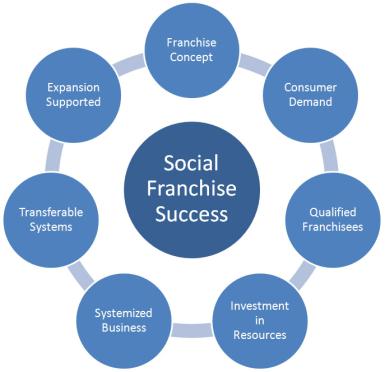|
The promise of social franchising to deliver sustainable solutions to society’s social needs is grounded in the fundamental principles that have made franchising such a successful replication model in the commercial sector. Unfortunately, most social franchise implementers are not familiar enough with those principles to optimize franchising’s potential. This article is intended to shed light on the key conditions that all implementers should be aware of when designing or striving to improve a social franchise.
It will also be useful for funders of social franchisors to be aware of these conditions so that their investments are supporting best practices and driving the field of social franchising toward a more impactful and sustainable future. Conditions Required for a Social Franchise to SucceedSocial franchising will deliver results, just like commercial franchising delivers results, when certain conditions are in place. These are[1]:
When all of these conditions are in place, it is safe to conclude that the concept is franchisable. The next step would then be to design the franchise. Elements of Good Social Franchise Design Once the groundwork for success is laid by creating the conditions described above, the franchise can be designed. Following are some key elements of all good franchise designs that should be addressed when designing or strengthening a social franchise system.
ConclusionImplementers and funders of social franchising will dramatically improve their bottom lines when they understand the fundamentals of franchising discussed in this article. There are experts in the field of franchising that can help with both design and execution of social franchises in the same way that they help commercial businesses. The International Franchise Association’s Social Sector Task Force has established a mentor program, and consulting firms like MSA Worldwide offer highly specialized technical support in social franchising. Whether a social business considering expansion through franchising, or an NGO that has been operating a franchise and is looking to improve its performance, there are resources available to help implementers make smart design decisions that will enable them to achieve social and financial goals. In the end, while many parties benefit from a well-designed social franchise, those who stand to benefit most are the people in need of the products and services being franchised. It behooves us all to make the effort to learn from each other so that we can better serve those in need and make this world a better place. [1] Seid, Michael and Thomas, Dave; Franchising for Dummies, 2nd Edition, Wiley Publishing, Inc., 2010. Comments are closed.
|
Blog Team
Posts on our blog are contributed by a team of professionals dedicated to developing valuable resources for the Social Sector Franchising community. Archives
May 2024
|


 RSS Feed
RSS Feed
